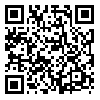Sun, Jun 22, 2025
[Archive]
Volume 12, Issue 47 (Jun 2004)
J Adv Med Biomed Res 2004, 12(47): 23-29 |
Back to browse issues page
Download citation:
BibTeX | RIS | EndNote | Medlars | ProCite | Reference Manager | RefWorks
Send citation to:



BibTeX | RIS | EndNote | Medlars | ProCite | Reference Manager | RefWorks
Send citation to:
Jafari N, Anoosheh M, Ahmadi F, Namadian M. Effect of Family Counseling on Blood pressure in women Suffering from Hypertension. J Adv Med Biomed Res 2004; 12 (47) :23-29
URL: http://journal.zums.ac.ir/article-1-324-en.html
URL: http://journal.zums.ac.ir/article-1-324-en.html
Abstract: (186264 Views)
Background: Hypertension is a serious health hazard and an important factor in disability and mortality. Regarding the importance of effective preventive and control measures, this study was carried out with the aim of determining the effect of family counseling on controlling blood pressure in women suffering from hypertension in Nimavar (a village in Zanjan province) 2004. Materials and Methods: This quasi-experimental study was conducted on women suffering from hypertension who were selected through convenience sampling access method. Blood pressure of all married women of the village was measured according to international league of blood pressure standard and women with blood pressures over or equal to 140/90 mmHg within three measures, entered the research. To confirm the validity of the questionnaire, we used the content validity method and to confirm the reliability we used test retest method. Then, the counseling plan was performed on patients’ families for a month (almost 10 sessions for each family according to the requirements) and blood pressure of the suffering women was measured on a weekly basis. Mean blood pressures of samples were recorded a month before, during the counseling and two months after counseling. Difference in blood pressure before and after counseling was analysed using variance analysis and t-test. Results: The survey of 41 women suffering from hypertension results revealed that the mean systolic blood pressure of the patients declined from 166.3±18.2 mmHg before counseling to 141.2±12.9 mmHg after counseling. Besides, the mean diastolic blood pressure declined from 102.9±7.49 mmHg before counseling to 90±26.2 mmHg three months following counseling (P=0.0001) there was a significant difference in systolic and diastolic pressure between the first month, the second month and the third month before and after counseling (p=0.0001) Conclusion: The results indicated that family counseling could be an effective way of controlling hypertension. Thus, regarding the research society and sample size, efficacy of the procedure should be tested in urban societies using more extensive studies.
Type of Study: Original Research Article |
Received: 2008/09/28 | Accepted: 2004/06/15 | Published: 2004/06/15
Received: 2008/09/28 | Accepted: 2004/06/15 | Published: 2004/06/15
| Rights and permissions | |
 |
This work is licensed under a Creative Commons Attribution-NonCommercial 4.0 International License. |




